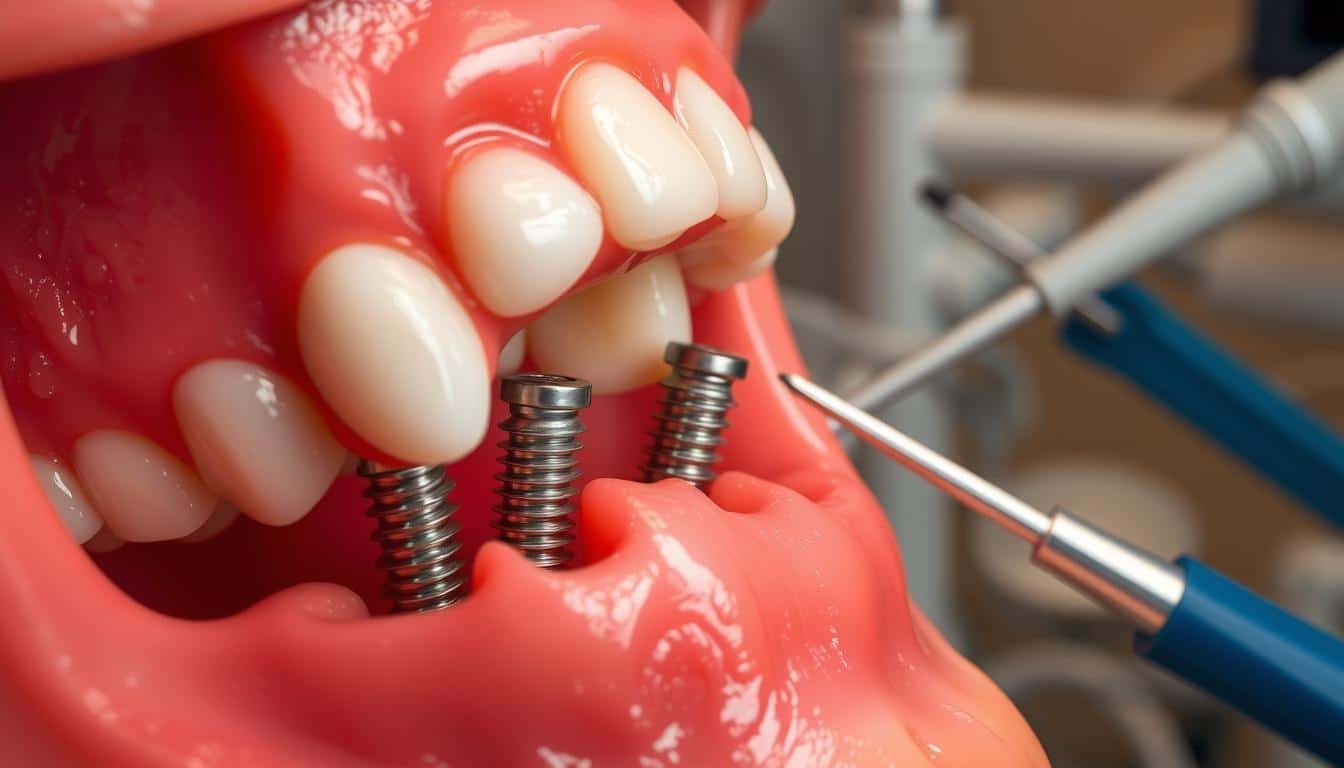Are you thinking about dental implants but worried about insurance costs? You’re not alone. Many face the financial challenge of this life-changing procedure. But, getting a beautiful, functional smile might be easier than you think.
In this detailed guide, we’ll dive into dental implant insurance coverage. We aim to help you understand the system better. This way, you can make the most of your benefits.
Key Takeaways
- Understand the basics of dental implants and their benefits
- Discover the various medical insurance options for dental implant coverage
- Learn how to effectively navigate the claims process and documentation requirements
- Explore factors that affect insurance coverage, such as medical necessity and pre-existing conditions
- Uncover strategies to maximize your insurance benefits and explore alternative financing options
Understanding Dental Implants
Dental implants are a new way to replace missing teeth. They are titanium posts that are put into the jawbone. This makes a strong base for new teeth.
They work like real tooth roots. This makes them a lasting and strong choice for fixing your smile and health.
Also Read: Allergy Test Cost with Insurance: What to Expect.
What Are Dental Implants?
Dental implants are fake tooth roots. They are made of titanium, which fits well with the jawbone. This creates a solid base for the new tooth.
After the implant is in, a custom crown is put on. This makes the new tooth look and work like a real one.
Benefits of Dental Implants
- Improved appearance: Dental implants look and feel like your natural teeth. They make your smile better and boost your confidence.
- Restored functionality: With dental implants, you can eat all your favorite foods. You won’t have to worry about missing teeth anymore.
- Long-term durability: Dental implants are made to last forever. They are a permanent fix for missing teeth.
- Preserving natural teeth: Dental implants don’t harm your other teeth. They help keep your natural teeth strong.
- Improved oral health: Dental implants stop bone loss and gum shrinkage. This helps keep your mouth healthy and well.
Knowing the benefits of dental implants helps people with missing teeth make good choices. It’s the first step to a better smile and life.
How to Get Dental Implants Covered by Medical Insurance
Understanding medical insurance can be tough, especially for dental implants. But, with the right steps, you can get your implants covered. Let’s look at how to make your insurance pay for dental implants.
Understand Your Insurance Policy
Start by carefully reading your insurance policy. Look for parts that cover dental implants. Some policies see implants as a medical need, especially after accidents or illnesses. Make sure to note any exclusions.
Document Your Medical Necessity
To boost your claim’s chances, gather lots of proof. This includes:
- Records from your dentist or oral surgeon showing why you need implants
- Reports from doctors linking implants to health issues or accidents
- Treatment plans and cost estimates from your dentist
Submit a Preauthorization Request
Before getting implants, ask your insurance for preauthorization. This can show if your claim will pass and what issues might come up. Your dentist or doctor can help with this.
By following these steps and showing why you need implants, you can get your insurance to pay. Being proactive and thorough is key.
| Factors That May Influence Insurance Coverage | Explanation |
|---|---|
| Medical Necessity | Insurance might cover implants if they’re medically needed, like after trauma or certain conditions. |
| Pre-Existing Conditions | If implants are for a pre-existing issue, insurance might be more likely to cover it. |
| Dental-Medical Integration | Some plans see oral health as part of overall health, so they might cover implants more easily. |
“Dental implants can be a life-changing investment, and it’s crucial to explore every avenue for insurance coverage to make them more accessible.”
Exploring Insurance Coverage Options
Understanding your insurance options for dental implants is key. Private health insurance and government programs can help with costs. Let’s look at each option to guide you.
Private Health Insurance Plans
Many private health insurance plans cover dental implants. But, the coverage varies a lot. Some plans cover part of the cost, while others have strict rules or don’t cover it at all. It’s important to check your plan’s benefits and talk to your insurance company.
Also Read: Cost of Chest X-Ray Without Insurance: Price Guide.
Government-Sponsored Programs
Government programs like Medicare and Medicaid might cover dental implants in some cases. The rules and what’s covered can change based on the program and where you live. Knowing your options and what you need can help you get coverage.
| Coverage Option | Key Features | Eligibility Criteria |
|---|---|---|
| Private Health Insurance |
|
Based on individual insurance plan and provider |
| Medicare |
|
Individuals aged 65 or older, or those with certain disabilities |
| Medicaid |
|
Based on income level and other state-specific requirements |
Finding the right insurance for dental implants can be tough. But knowing your options and what you need can help. This way, you can make the best choice for your situation.
Navigating the Claims Process
Getting insurance for dental implants can be tricky. But knowing what documents you need is key. If you’re wondering does insurance pay for dental implants or want to know about insurance coverage dental implant costs, understanding the claims process is vital.
Documentation and Paperwork
To get your dental implant claim processed fast, you’ll need to gather a lot of documents. You’ll need:
- A detailed treatment plan from your dentist, outlining the recommended implant procedure and associated costs
- Diagnostic records, such as X-rays or CT scans, to show why the implant is needed
- Your insurance policy information, including your plan’s specific coverage details for dental implants
- Any relevant pre-authorization forms or prior approval documentation
Make sure to check your insurance plan’s requirements and submission guidelines. A complete and accurate claim can speed up approval and increase coverage chances.
“Navigating the claims process for dental implants can be daunting, but with the right documentation and a little persistence, you can maximize your chances of securing insurance coverage.”
If you’re having trouble or have questions, reach out to your insurance provider or your dentist’s billing team. They can offer valuable advice and support. This will help you on your journey to getting dental implants and restoring your smile.
Factors Affecting Insurance Coverage
Getting dental implants covered by insurance can be tricky. It’s important to know what affects coverage. Medical necessity and pre-existing conditions are two big factors.
Medical Necessity
Insurance companies check if dental implants are really needed. They look at if implants are for health or just looks. If you lost teeth due to injury, disease, or birth defect, it might be covered.
But, if you want implants just for looks, you might not get insurance help.
Pre-Existing Conditions
Your past health can also affect insurance for dental implants. If you lost teeth because of gum disease or diabetes, your implants might be covered. This is because they’re seen as part of treating your existing health issues.
By understanding these factors and working with your doctors, you can boost your chances of getting how to get dental implants covered by medical insurance and insurance for dental implants approved.
Maximizing Your Insurance Benefits
Understanding your insurance policy is key when getting dental implants. This includes getting implants covered by insurance and managing insurance coverage dental implant costs. This section offers practical tips to maximize your insurance benefits.
Also Read: Protect Your Business with Key Man Disability Insurance.
Understand Your Policy Coverage
First, review your insurance policy carefully. Look for details like:
- Annual coverage limits
- Deductibles and co-payments
- Restrictions or exclusions related to dental implants
- Preauthorization requirements
Negotiate with Your Provider
Don’t hesitate to negotiate with your insurance provider. If your policy doesn’t cover the full cost, try these steps:
- Ask for a detailed explanation of coverage limits
- Offer medical documentation to show the implants are necessary
- See if partial coverage or a compromise is possible
Explore Cost-Saving Measures
Look for ways to save money on dental implants. This includes:
| Measure | Description |
|---|---|
| Dental Discount Plans | Joining a dental discount plan can save a lot on implant costs. |
| Payment Plans | Many dentists offer payment plans or financing to help with costs. |
“Maximizing your insurance benefits can be a game-changer when it comes to affording the cost of dental implants. With a little research and negotiation, you can get the coverage you need to restore your smile.”
By using these tips, you can better understand dental implant insurance. This way, you can make the most of your insurance benefits.
Alternative Financing Options
Getting dental implants can be tricky due to insurance limits. But, there are other ways to make this treatment affordable.
Dental Discount Plans
Dental discount plans are great for those without insurance. They connect you with dentists who offer lower prices for implants. Joining a plan can save you a lot of money.
Payment Plans
Payment plans are another option. Dental offices or financing companies offer these to help with costs. You can pay over time, often with little to no interest.
Choosing a dental discount plan or payment plan can help. They make dental implants more affordable, even with limited insurance. These options are key to getting the smile you want.
Choosing the Right Dental Implant Provider
When it comes to implant dentistry and insurance, picking the right dental implant provider is key. The success of your procedure and the chance of insurance coverage for dental implant costs depend on the provider’s expertise. Here’s what to look for when finding a reputable dental implant provider.
Researching Reputable Providers
First, make a list of experienced dental implant specialists near you. Look for those with lots of training and positive patient feedback. Consider these factors when checking out potential providers:
- Board certification in periodontology or oral and maxillofacial surgery
- Years of experience in dental implant procedures
- Use of advanced technology, like 3D imaging and computer-guided placement
- Positive patient testimonials and high satisfaction rates
- Good relationships with insurance providers to help with claims
By carefully researching and choosing a qualified dental implant provider, you boost your chances of a successful procedure. This also helps you get the most from your insurance coverage for dental implant costs. It ensures a good experience and a lasting, functional restoration.
“Choosing the right dental implant provider is essential for ensuring the success of your procedure and maximizing your insurance coverage.”
Preventive Dental Care
Dental implants are great for missing teeth, but don’t forget about preventive dental care. It’s key to keep your teeth and gums healthy. This can help you avoid needing implants and affect your dental implant insurance coverage and insurance pays for dental implants options.
Maintaining Oral Health
Good oral health is vital for your overall health. Here are some important steps:
- Brush your teeth at least twice a day with a soft-bristled toothbrush and fluoride toothpaste.
- Floss daily to remove plaque and food particles from between teeth.
- Rinse with an antimicrobial mouthwash to help prevent gum disease.
- Schedule regular dental check-ups and cleanings, typically every six months.
- Avoid habits that can damage your teeth, such as teeth grinding, chewing ice, or using tobacco products.
By focusing on oral hygiene and preventive care, you can lower your risk of dental problems. This can save you money and help you get dental implant insurance coverage. It also increases the chance that insurance will pay for dental implants.
Investing in preventive dental care is good for your health and can save you money. It helps you avoid expensive treatments. By taking care of your teeth, you can have a healthier, more confident smile.
Conclusion
In this article, we’ve covered how to get dental implants covered by insurance. We talked about the benefits of dental implants and how to navigate the claims process. You now know the steps to take.
Getting your dental implants covered is possible with the right steps. Research well, talk to your insurance provider, and be proactive. Knowing what your insurance covers and any conditions that might affect you can help a lot.
As you plan for your dental implants, keep researching and talking to your providers. Work together with your dentist and insurance company. With the right information and teamwork, you can get the care you need.
FAQ
What are dental implants?
Dental implants are artificial tooth roots placed in the jawbone. They replace missing teeth. These implants support custom-made, natural-looking teeth.
What are the benefits of dental implants?
Dental implants improve your smile and help you chew and speak better. They last a long time and prevent jawbone loss.
How can I get dental implants covered by my medical insurance?
To get dental implants covered, you must meet certain requirements. You’ll need to provide the right documents and submit your claim correctly. Working with your dental and insurance teams is key.
What types of insurance coverage are available for dental implants?
You can find dental implant coverage in private insurance and government programs like Medicare and Medicaid. Coverage and rules vary, so it’s important to know your options.
What documentation is required for the insurance claims process?
You’ll need dental records, treatment plans, and pre-authorization for the claims process. Properly preparing and submitting this information is crucial for approval.
How does the medical necessity of dental implants affect insurance coverage?
Insurance checks if dental implants are medically necessary. They look at reasons for tooth loss, like injury or disease. Showing the need for your treatment can help get coverage.
What can I do to maximize my insurance benefits for dental implants?
To get the most from your insurance, know your policy’s limits and negotiate. Look for ways to lower costs, like dental discount plans or payment plans.
What are some alternative financing options for dental implants if insurance coverage is limited?
If insurance is limited, consider dental discount plans and payment plans. These options can make implants more affordable.
How can I choose the right dental implant provider to ensure successful treatment and insurance coverage?
Choosing a qualified dental implant provider is crucial. Research, check credentials, and evaluate experience to ensure quality care and insurance approval.
Why is preventive dental care important, even when considering dental implants?
Good oral health through regular care can reduce the need for implants. This can save you money and improve your insurance coverage.
Sajjad Hossain is an experienced writer on StatusCaption.xyz, specializing in insurance, business ideas, money management, and investment. With a passion for simplifying complex financial topics, [Author Name] provides clear and actionable insights to help readers make informed decisions in their financial journey. Committed to delivering expert advice and practical tips, Sajjad Hossain aims to empower readers to achieve their financial goals confidently and strategically.



